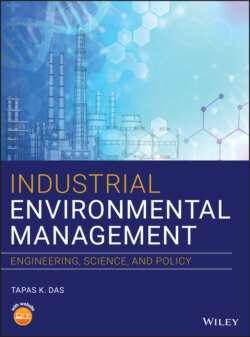Читать книгу Industrial Environmental Management - Tapas K. Das - Страница 122
2.13.2 Legislation for Environmental Protection in India 2.13.2.1 Water
ОглавлениеWater quality standards especially those for drinking water are set by the Indian Council of Medical Research. These bear close resemblance to WHO standards. The discharge of industrial effluents is regulated by the Indian Standard Codes, and recently water quality standards for coastal water marine outfalls have also been specified. In addition to the general standards, certain specific standards have been developed for effluent discharges from industries, such as iron and steel, aluminum, pulp and paper, oil refineries, petrochemicals, and thermal power plants. Legislation to control water pollution is listed below:
Water (Prevention and Control of Pollution) Act, 1974This Act represented India's first attempts to comprehensively deal with environmental issues. The Act prohibits the discharge of pollutants into water bodies beyond a given standard, and lays down penalties for noncompliance. The Act was amended in 1988 to conform closely to the provisions of the USEPA in 1986. It set up the CPCB which lays down standards for the prevention and control of water pollution. At the State level, the SPCBs function under the direction of the CPCB and the state government.
Water (Prevention and Control of Pollution) Cess Act, 1977This Act provides for a levy and collection of a cess on water consumed by industries and local authorities. It aims at augmenting the resources of the central and state boards for prevention and control of water pollution. Following this Act, The Water (Prevention and Control of Pollution) Cess Rules were formulated in 1978 for defining standards and indications for the kind of and location of meters that every consumer of water is required to install.
